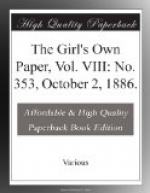By the Hon. Victoria Grosvenor.
We believe that young people generally have a desire to be useful. Sometimes not an actually formulated desire, but a vague intention which they mean some day shall have a practical issue, when and how they do not quite know, or in what way. It is proposed in this article to point out one means of eminent usefulness—i.e., that of amateur organ playing in our churches. It is scarcely necessary to show what a large field of good useful work is open to amateurs in this direction. We all know that on the one hand parishes wholly agricultural—the other suburban parishes in large towns—are utterly unable to pay for the services of a professional player; while there is nothing so calculated to lift up the heart of the congregations such as these are likely to obtain, as good music. Would it not therefore be a pleasant duty for anyone gifted with musical talent and leisure to qualify in the best manner possible for this ennobling and helpful occupation?
The intending organ-player must ascertain that he or she has a gift for music, and this need not be of the highest order, as even a small portion of the gift can be improved with care, and fostered into usefulness. A first rate ear can be a snare to those who trust to it too much—although it is undoubtedly the best of servants, if kept in its proper sphere of work. A very ordinary measure of talent, supplemented by calm and good sense, clear power of thought, and determined perseverance, will be a good foundation to start with. Good sense and attention have more to do with the good music of ordinary persons (as opposed, we mean, to remarkably clever ones) than people are apt to think. It was said of Mendelssohn that music was the accident of his being; and there are many of whom the same could be said, with this meaning—i.e., that the powers which make them succeed in music would enable them to succeed in other great things if attempted.
We will therefore suppose the case of a young lady possessing a moderate gift for music, desiring to improve it and herself, and to take up organ playing with a view to real usefulness. She should first find out whether her playing on the piano is perfectly correct, taking the easiest possible music to exercise herself upon, and trying whether her musical ear is competent to be her teacher in the matter of correctness. If neither steady attention nor ear enable her to discover mistakes, she had better consider that music is not the talent God has given her to use to His glory. A musical ear may, however, be much improved by its possessor. With even the smallest of voices she should join a choir or madrigal society and learn to sing at sight. She should, when listening to a musical performance, try to guess its key. She should endeavour to know, without seeing, the sound and name of single notes on the piano, practising herself with her eyes shut. It is good practice,




